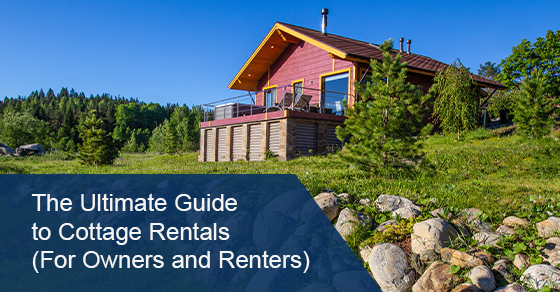
The Ultimate Guide to Cottage Rentals (For Owners and Renters)
There’s nothing better than enjoying the summer to the fullest. Whether this means hitting up the beach and the pools to soak in the hot sun or even just hosting intimate to rowdy barbecues in your backyard with family, friends and loved ones, there’s quite a lot to do.
And on that list, as one of the perennial pleasures, is the cottage. Visiting one can be delightful and owning one is even better both because of the great investment in property and because it’s a location that can pay out dividends even while not in use.
We’re talking, of course, about the magical world of renting out your property. While it does take some effort it’s something that’s well worth it. Here’s how to do it right.
Get Insured
The first thing you need to do when you’re considering renting out your recreational residence is to make sure that you can get insurance to cover the property in the event of poor or destructive guests. This is absolutely critical because you don’t want to be on the hook for hugely expensive repairs or other fees.
But first, make sure you’re not breaking any of the minimum requirements. If you do things like permitting your tenants to use your recreational vehicles (think ATVs and boats) you’re likely too much of a risk to cover. For similar reasons you shouldn’t provide life jackets to your tenants, you shouldn’t allow smoking and you shouldn’t leave personal belongings in the space when you’re not using it.
Of course, you might still want some amenities to attract renters but this is a conversation you should have with your insurance broker.
Make sure also to discuss any risk factors inherent to your property. These are things like wood stoves, shallow water, docks and decks, steep inclines and slippery surfaces, alcohol and fire pits. You’ll also have to tell them about the frequency and duration of rental terms. It’s absolutely critical that you’re 100% clear on what the risks and usage will be so that your policy can cover it and you’re not finding yourself unexpectedly paying out huge costs at some future date.
If you really want your guests to have access to watercraft, for instance, you’ll need to have a separate insurance policy to cover that area.
So cottage rental insurance is one way to go when it comes to protecting your property but another question you may have is if homeowners insurance on its own is enough. Unfortunately, it’s unlikely to do the trick alone. Usually, this type of coverage doesn’t cover business liabilities, meaning you might also want to spring for business insurance. Of course, cottage-specific insurance will cover all of this or more.
Remember to get insurance – and talk about the nitty-gritty details with your provider.
Investigate and Clarify
Now that you’ve got insurance covered you’re on the more glamorous part of actually finding renters and tenants to take advantage of your beautiful property.
However, you want to find trustworthy ones as, even with insurance, it’s still quite a process to make a claim. So you need to exercise caution when it comes to potential renters. Obviously, you want to verify that their payment information is correct and functioning properly but even beyond that you may want to do your own research.
For instance, try asking them about their reason for staying while you’re talking with them and get a feel for what type of person they are – are they going to be partying the night away on your property? Is that something you’re comfortable with? Trust your instincts here but be wary of unfair bias.
To make things even more clear-cut, it can be a good idea to set solid rules both before and during renting out. Beforehand, narrow down who you want in your space in terms of things like whether pets are allowed in and whether you want a non-smoker.
Once that’s done, you want to avoid being surprised by things left behind after a rental. You should think about the specific expectations you have for guests and how they conduct themselves and you should make this clear.
This includes things like asking the guests to clean before leaving, to take out garbage, to keep noise levels down after a certain time, or other concerns of this nature. Put these rules in a list and leave it in a place where your renter can see it. You can even try getting the renter to sign an agreement listing their responsibilities during their stay.
Prepare the Space
Now you’ve locked down rules, insurance and an actual tenant. All that’s left to do is prepare the space before your renter’s arrival. You don’t want negative reviews hampering your future ability to get tenants, so make sure to pretty the place up.
Renters have standards too and you want to make sure you meet them. Make sure electric wiring and utilities are functioning properly and also clean the space out. Make sure to clear away dust and piles of objects you’re not planning on using – this is critical to having satisfied tenants and hopefully more future ones.
Closing Thoughts
There’s really not too much involved with renting out your property. It’s one of those things that seem daunting until you actually start doing it and you realize that it’s about as easy as 1-2-3. So long as you get insurance and do all the right prep work, from vetting tenants to cleaning the space, you’re sure to do fine!
Now that you know all you need to know about both cottage rentals you may be considering the idea of cottage rental insurance. In fact, this is a great idea and one that can protect you in many different ways. Sure, there is a premium to be paid, but it’s reasonably priced.
If you would like to learn more about cottage rentals, call W.B. White Insurance at 1-877-420-4572 or contact us here.
Leave A Comment
The comments are closed.


